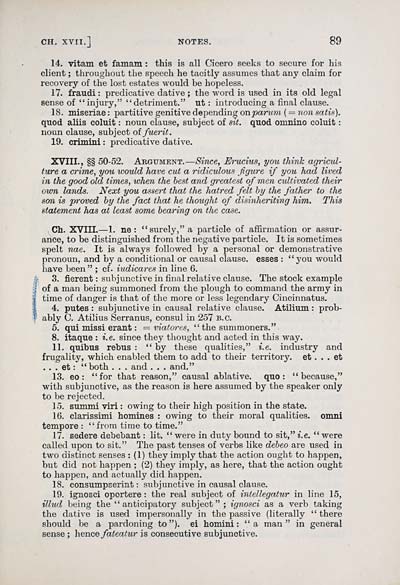Download files
Complete book:
Individual page:
Thumbnail gallery: Grid view | List view

CH. XVII.] NOTES. 89
14. vitam et famam : this is all Cicero seeks to secure for his
client ; throughout the speech he tcacitly assumes that any claim for
recovery of the lost estates would be hopeless.
17. fraudi : predicative dative ; the word is used in its old legal
sense of "injury," "detriment." ut : introducing a final clause.
18. miseriae : partitive genitive depending onparum ( = non satis).
quod aliis coluit : noun clause, subject of sit. quod omnino coluit :
noun clause, subject oifuerit.
19. crimini : predicative dative.
XVIII., §§ 50-52. Aegument. — Since, Erucius, you thinlc agricul-
ture a crime, ymi ivould have cut a ridiculous figure if you had lived
in the good old times, when the hest and greatest of men cultivated their
own lands. Next you assert that the hatred felt hy the father to the
son is proved hy the fact that he thought of disinheriting him. This
etatement has at least some bearing on the case.
Ch. XVIII. — 1. ne : "surely," a particle of afSrmation or assur-
ance, to be distinguished from the negative particle. It is sometimes
spelt nae. It is alwa^^s foUowed by a personal or demonstrative
pronoun, and by a conditional or causal clause. esses : "you would
have been " ; cf . iudicares in line 6.
,j 3. fierent : subjunctivein finalrelativeclause. The stock example
;' of a man being summoned from the plough to eommand the army in
2 time of danger is that of the more or less legendary Cincinnatus.
I 4. putes : subjunctive in causal relative clause. Atilium : prob-
r ably C. Atilius Serranus, consul in 257 B.c.
5. qui missi erant : = viafores, " the sumraoners."
8. itaque : i.e. since they thought and acted in this way.
11. quibus rebus : " by these qualities," i.e. industry and
frugality, which enabled them to add to their territory. et . . . et
. . . et : " both . . . and . . . and."
13. eo : "for that reason," causal ablative. quo : " because,"
with subjunctive, as the reason is here assumed by the speaker only
to be rejected.
15. summi viri : owing to their high position in the state.
16. clarissimi homines : owing to their moral qualities. omni
tempore : "from time to time."
17. sedere debebant : lit. " were in duty bound to sit," i.e. " were
called upon to sit." The past tenses of verbs like deheo are used in
two distinct senses : (1) they imply that the action onght to happen,
but did not liappen ; (2) they imply, as here, that the action ought
to happen, and actually did happen.
18. consumpserint : subjunctive in eausal clause.
19. ig^nosci oportere : the real subject of inteUegatur in line 15,
illud being the " anticipatory subject " ; ignosci as a verb taking
the dative is used impersonally in the passive (literally " there
should be a pardoning to "). ei homini : "a man " in general
sense ; hencB fateatur is consecutive subjunctive.
14. vitam et famam : this is all Cicero seeks to secure for his
client ; throughout the speech he tcacitly assumes that any claim for
recovery of the lost estates would be hopeless.
17. fraudi : predicative dative ; the word is used in its old legal
sense of "injury," "detriment." ut : introducing a final clause.
18. miseriae : partitive genitive depending onparum ( = non satis).
quod aliis coluit : noun clause, subject of sit. quod omnino coluit :
noun clause, subject oifuerit.
19. crimini : predicative dative.
XVIII., §§ 50-52. Aegument. — Since, Erucius, you thinlc agricul-
ture a crime, ymi ivould have cut a ridiculous figure if you had lived
in the good old times, when the hest and greatest of men cultivated their
own lands. Next you assert that the hatred felt hy the father to the
son is proved hy the fact that he thought of disinheriting him. This
etatement has at least some bearing on the case.
Ch. XVIII. — 1. ne : "surely," a particle of afSrmation or assur-
ance, to be distinguished from the negative particle. It is sometimes
spelt nae. It is alwa^^s foUowed by a personal or demonstrative
pronoun, and by a conditional or causal clause. esses : "you would
have been " ; cf . iudicares in line 6.
,j 3. fierent : subjunctivein finalrelativeclause. The stock example
;' of a man being summoned from the plough to eommand the army in
2 time of danger is that of the more or less legendary Cincinnatus.
I 4. putes : subjunctive in causal relative clause. Atilium : prob-
r ably C. Atilius Serranus, consul in 257 B.c.
5. qui missi erant : = viafores, " the sumraoners."
8. itaque : i.e. since they thought and acted in this way.
11. quibus rebus : " by these qualities," i.e. industry and
frugality, which enabled them to add to their territory. et . . . et
. . . et : " both . . . and . . . and."
13. eo : "for that reason," causal ablative. quo : " because,"
with subjunctive, as the reason is here assumed by the speaker only
to be rejected.
15. summi viri : owing to their high position in the state.
16. clarissimi homines : owing to their moral qualities. omni
tempore : "from time to time."
17. sedere debebant : lit. " were in duty bound to sit," i.e. " were
called upon to sit." The past tenses of verbs like deheo are used in
two distinct senses : (1) they imply that the action onght to happen,
but did not liappen ; (2) they imply, as here, that the action ought
to happen, and actually did happen.
18. consumpserint : subjunctive in eausal clause.
19. ig^nosci oportere : the real subject of inteUegatur in line 15,
illud being the " anticipatory subject " ; ignosci as a verb taking
the dative is used impersonally in the passive (literally " there
should be a pardoning to "). ei homini : "a man " in general
sense ; hencB fateatur is consecutive subjunctive.
Set display mode to: Large image | Transcription
Images and transcriptions on this page, including medium image downloads, may be used under the Creative Commons Attribution 4.0 International Licence unless otherwise stated. ![]()
| Early Gaelic Book Collections > Matheson Collection > Pro S. Roscio Amerino > (97) |
|---|
| Permanent URL | https://digital.nls.uk/76503399 |
|---|
| Description | Items from a collection of 170 volumes relating to Gaelic matters. Mainly philological works in the Celtic and some non-Celtic languages. Some books extensively annotated by Angus Matheson, the first Professor of Celtic at Glasgow University. |
|---|
| Description | Selected items from five 'Special and Named Printed Collections'. Includes books in Gaelic and other Celtic languages, works about the Gaels, their languages, literature, culture and history. |
|---|

